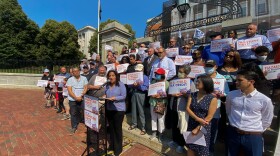Francisco Ayala never envisioned having any rights as a drywall worker. He said he arrived in Chelsea from El Salvador as an undocumented immigrant in 2006. He believed he had to accept any treatment to make a living.
Ayala later realized he was being mistreated and didn't feel he could speak up for himself, he said through a translator.
He said he earned about $20 an hour with no benefits, which some industry leaders say is well under typical union pay. Ayala said he was not given proper tools or protective equipment, like hard hats.
Ayala is one example of many undocumented construction workers highlighted in a June report from the Labor Center at UMass Amherst.
According to the study, large residential contractors often use “labor brokers” to bring undocumented workers onto construction sites and underpay them in cash, costing the state up to $80 million a year in unemployment payments and taxes.
“Residential construction companies are saving up to $140 million a year in reduced labor costs because they’re hiring undocumented workers,” lead researcher Tom Juravich said. “And they’re not paying any benefits on them, so they save 30 percent by not paying taxes, workers compensation, unemployment, social security, etcetera.”
Andrew Crane, executive director for the Association of Home Builders and Remodelers of Western Massachusetts, said he is aware of construction companies exploiting undocumented workers.
“It's been happening forever. So this is not a new thing,” Crane said. “Unfortunately, there is not enough money in the system, there is probably not enough desire in the system, to really dig in and find, locate and police these projects that are using undocumented workers.”
Juravich said undocumented workers do have rights under Massachusetts law.
“You...should be paid time and a half for your overtime. You should be paid each week. You have the right to a safe workplace,” Juravich said. “All those things apply to everybody.”
The office of Massachusetts Attorney General Maura Healey, which is in charge of enforcing labor laws, declined an interview request.
When asked by email whether the office was doing enough to protect workers, a spokesperson sent a statement saying “the construction industry continues to be a priority" for the attorney general's Fair Labor Division.
“In addition to robust enforcement,” the statement read, “we have dedicated outreach efforts to reach immigrant workers who are often more susceptible to wage theft and may be more hesitant to report it.”
Ayala said he was never given any information about his rights, either by the government or contractors he worked for.
Today, Ayala is a part of a union — the North Atlantic States Regional Council of Carpenters, or NASRCC — after an organizer reached out to him on a construction site. Ayala said he is now making a livable wage as a drywall worker and can support himself, his two daughters and three nieces.
NASRCC is pushing municipalities in Massachusetts to pass an ordinance, based on a draft it has crafted, that would allow them to stop construction projects where wage theft is going on.
Juravich of UMass said he hopes the Legislature passes a wage transparency bill that would hold construction companies accountable for mistreatment of undocumented workers. It’s currently awaiting a vote in the Joint Committee on Labor and Workforce Development.




